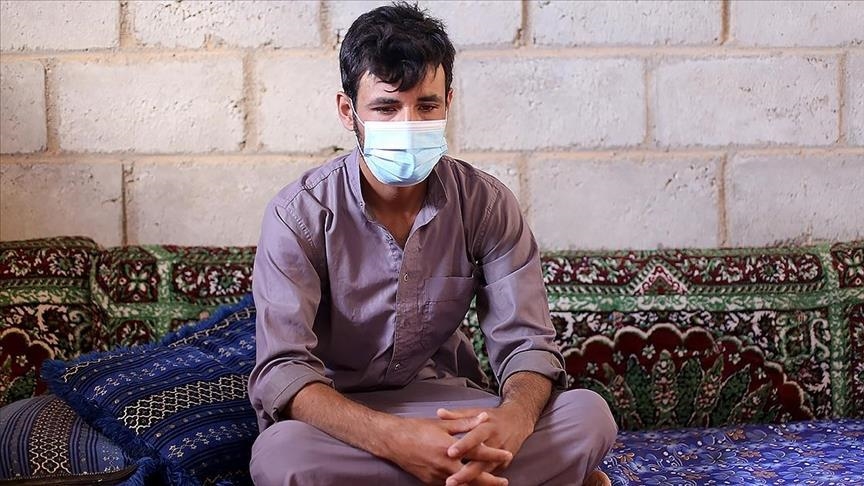Syrian prisoner released in return for money despite Assad regime's ‘amnesty’
Assad regime uses 'detainee file' as tool for extortion, says Mohammed Shilash
 Mohammed Shilash
Mohammed Shilash
DEIR-EZ-ZOR/AZAZ, Syria
A man imprisoned in Syria who was subjected to torture for three years says the Assad regime uses a "detainee file" as a tool for extorting money.
Mohammed Shilash, who is from the town of Sor in Deir Ez-Zor province, decided to leave the country to work in Lebanon in 2019 after his financial situation deteriorated due to the war.
Planning to cross into Lebanon without being caught by regime forces, Mohammed and his friends made a deal with a human smuggler.
But his dream of leaving for Lebanon came to nothing with his arrest by regime forces at the meeting point with the human trafficker in the capital, Damascus.
After footage of the “Tadamon Massacre” carried out by Assad regime forces surfaced in April this year, the regime legislated a “repentance law.”
Syria's military intelligence service conducted the massacre in the Tadamon neighborhood of Damascus in April 2013, and Palestinians were among the 41 victims. Members of Branch 227 forced civilians to run toward a mass grave while shooting at them. Those murdered in the massacre were apparently Syrian loyalists who were killed in order to threaten local residents against joining insurrectionists.
The Assad regime, which keep at least 132,000 Syrians in prisons, released only 476 people in line with the new law, according to the Syrian Network for Human Rights (SNHR), which documents human rights abuses in Syria.
'I was accused of being Iraqi'
Having obtained his freedom by giving a bribe despite the amnesty, Mohammed said they were held in a regime prison for three years without any charges.
"We thought we would be free in two days…Our eyes were blindfolded. They put us in single cells. We were in fear. At that moment, we realized that we had fallen into the hands of al-Muhabarat," or General Intelligence Directorate, he said, speaking to Anadolu Agency.
He said he carried the identity card of one of his younger relatives with him to avoid being forcibly recruited into the ranks of the regime forces in case of capture.
During the questioning, Mohammed said he told everything out of fear and confessed that the identity card did not belong to him.
"The identity issue made things worse. They accused me of being Iraqi. After that, the torture began. As a result of the torture, I confessed everything they wanted. I was subjected to beatings and torture for about one and a half months. I was subjected to humiliation and unspeakable curses," he said.
'Persecution usually took place after midnight'
Transferred to a prison in Damascus about one and a half months after his first detention, Mohammed said: "I was taken to a three-meter (9.84-foot) wide ward in the prison. There were many people in the tiny ward. There was no place to sit. Two days later, we were transferred to single cells," he added.
"We had no rights. They tortured without question. We were hanging from the ceiling by our arms. This was the worst of the torture.
"While we were in this state, they would pour water on us and hit us. The persecution usually took place after midnight."
He noted that the torture continued for months, saying: "We couldn't go to the toilet. We had to relieve ourselves where we were held."
"We would be left hungry. They would give three olives and a piece of bread. They only gave cheese once a week and they would dirty it too.”
'They wouldn't remove the corpses until they rotted'
Mohammed noted that people are constantly getting sick in prison due to bad conditions and that adequate health services are not provided.
“Dozens of people died from torture, disease and filth,” he said.
"They wouldn't remove the corpses until they rotted. They used to eliminate most of the corpses by burning. When I witnessed all this, I thought I would suffer the same fate as them. I never thought I would be free," he added.
Comparing the prison to a "slaughterhouse," he noted that massacres took place in regime dungeons.
Saying he could never get in touch with his family, Mohammed said his family got him transferred to Adra Central Prison in Damascus by paying a lot of money.
"I was held there for about six months. Adra Central Prison was better than Sednaya. It was as if I had escaped from hell," he said.
Mohammed said the so-called amnesty law announced by the Assad regime about two weeks ago is a game.
"Lastly, an amnesty was issued, but despite this, my family paid millions of Syrian liras for my release."
"Those in charge of prisons have turned our situation into a business. They extort big money from families."









